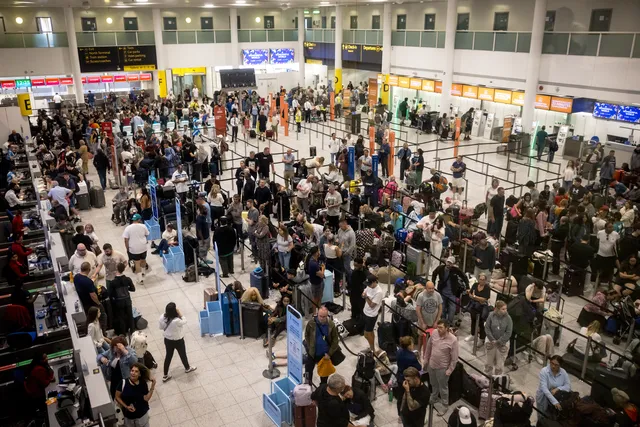In an unexpected turn of events, thousands of flights were temporarily grounded on Friday due to a major global IT outage. This incident underscores the critical importance of having robust disaster recovery plans in place, especially for industries that rely heavily on technology, such as aviation. As businesses and travelers grapple with the fallout, the role of disaster recovery becomes more evident than ever.

The Incident: A Global IT Outage Disrupts Air Travel
On Friday, a widespread IT outage, stemming from a software update issued by major US cybersecurity firm CrowdStrike, caused airline computers to become inoperable. This led to the temporary grounding of thousands of flights, causing significant delays and cancellations. Airports around the world, including major hubs like Hong Kong, Berlin, Amsterdam, Denver, and Manchester, reported long lines and distressed travelers as check-in systems went offline.
At the heart of this disruption was a critical vulnerability in the digital infrastructure of airlines, highlighting the need for comprehensive disaster recovery strategies.
Disaster Recovery in Action: How Airlines Responded
In response to the outage, airlines had to revert to analog methods. For instance, a traveler in India shared his experience of receiving a handwritten boarding pass for the first time. This shift to manual processes, while effective in the short term, also emphasized the fragility of relying solely on digital systems without a solid backup plan.
The Federal Aviation Administration (FAA) closely monitored the situation, assisting airlines with ground stops until the issue was resolved. As of early Friday morning, FlightAware’s Misery Map showed significant disruptions, with 1,401 delays and 365 cancellations across the US alone.
The Role of Disaster Recovery Plans
A robust disaster recovery plan involves more than just backing up data. It includes detailed procedures for restoring IT functionality and ensuring that all systems can be brought back online swiftly. In the case of the airline industry, this means having alternative systems and protocols in place to handle check-ins, boarding, and flight scheduling, even when primary systems fail.
For example, Delta Air Lines managed to resume some flight departures after addressing the vendor technology issue that impacted their operations globally. Delta’s proactive issuance of a travel waiver for customers allowed them to manage heir travel changes via the airline’s website and app, showcasing and effective recovery strategy in action.
Lessons Learned: Strengthening IT Resilience
This incident serves as a wake-up call for all industries that rely on technology. It’s crucial to invest in disaster recovery solutions that not only back up data but also ensure business continuity. Regularly testing these plans, training staff, and updating protocols to handle various types of IT failures can make a significant difference when disaster strikes.
The recent global IT outage that grounded thousands of flights is a stark reminder of the importance of disaster recovery. By having robust plans and systems in place, businesses can minimize disruptions and maintain trust with their customers. For more information on how our disaster recovery services can help safeguard your operations, visit our Disaster Recovery page.
Don’t leave your business vulnerable to IT outages. Contact us today to learn how our disaster recovery solutions can protect your operations and ensure business continuity.